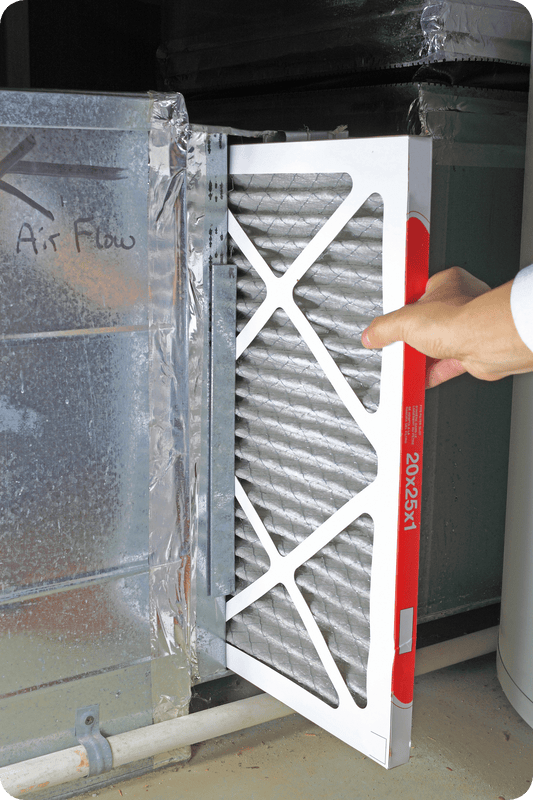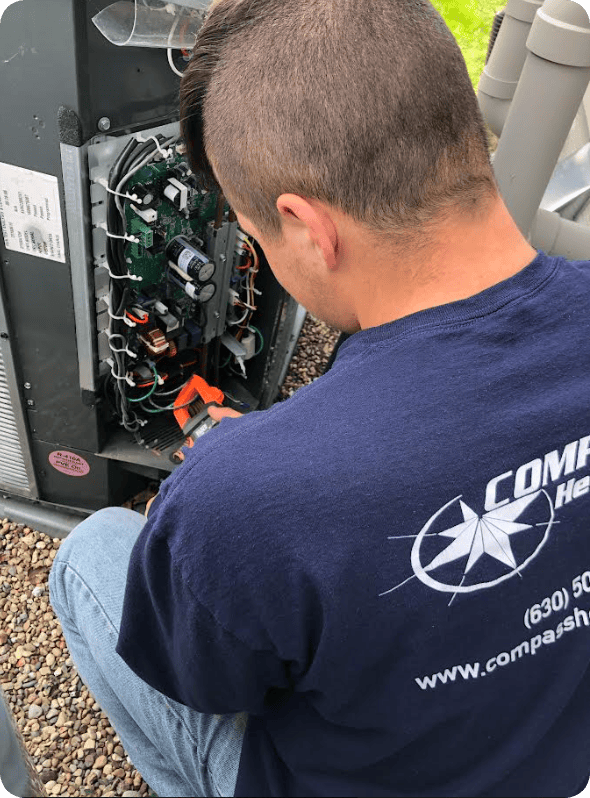Help You?
CLICK TO LEARN MORE ABOUT IRA REBATES AND TAX CREDITS
Air Conditioner Inspection Checklists For Homeowners
Compass Heating and Air Conditioning has been serving our heating and air conditioning customers since 2011. In that time, we have built a level of trust with our customers based on our expertise and product knowledge and respect for your home. We are proud to serve the Lake in the Hills community.
Since our founding, we have learned that when we take the time to educate our customers on their system – we all win! So we have put together this brief air conditioner homeowner’s checklist to help you maintain your AC unit and understand when it is time to call in a qualified technician.
DIY AC Inspection Checklist For Homeowners
This DIY checklist is designed to help keep you aware and informed. When performed regularly, this checklist can help keep your system running smoothly. And when you do need to call in a technician, it can help you save time because you have already done the basic troubleshooting.
Visual Inspection
Perform a thorough visual inspection of your AC unit, examining the condenser coil, condenser fan blade, and evaporator coil for any signs of wear or damage. Check the access panel, disconnect box, and disconnects to ensure proper safety and functioning.
 Change or Clean the Filter
Change or Clean the Filter
Changing or cleaning the air filter is a critical aspect of AC maintenance. Inspect the filter monthly and replace or clean it as necessary to promote proper airflow and maintain indoor air quality.
Thermostat Check
Conduct a thermostat test to confirm accurate temperature readings and calibration. If your thermostat isn’t functioning correctly, it may cause your AC to work harder, reducing efficiency and increasing energy bills.
Condensate Line Check
Ensure the condensate drain, drain line, and drain pan are clear of debris or blockages. Inspect the condensate pump if your system has one, and clean it as needed to prevent mold growth and potential damage.
Clean Around the Unit
Regularly clean the area around your AC unit to prevent debris buildup, pest infestations, and rodent feces. Check the foundation and ductwork for any signs of wear or air leaks. Inspect the duct seal, air vents, and return vents for proper airflow and safety.
What You Get With A Professional HVAC Inspection Or Tune-Up
There is much that you can do yourself to keep your system running smoothly. But there are times when only a qualified, licensed technician can perform certain tasks. Checks regarding coolant and electrical service should only be performed by a professional HVAC contractor.
Check Refrigerant Levels
A professional HVAC technician checks refrigerant levels, inspects the coil and compressor, and ensures proper suction line insulation. Proper refrigerant levels are crucial for the efficiency and performance of your air conditioner.
Check Electrical Connections
Technicians verify the supply voltage, tighten electrical connections, and examine surge protectors to ensure safety and reliability. They also inspect other electrical components, such as capacitors and contactors, for any signs of wear or damage.
Clean and Inspect All Moving Parts
During an HVAC inspection, all moving parts, including the blower motor and compressor, are cleaned and inspected. This full-system service helps maintain the heating and cooling system’s efficiency, extending its life and reducing energy bills.
Repairs & Replacements
A professional HVAC contractor will diagnose any issues and recommend necessary repairs or replacements. They can also provide a service agreement, which may include a labor warranty, ensuring that your heating and air conditioning equipment stays in peak condition throughout the heating and cooling seasons.
By investing in a professional HVAC inspection or tune-up, you can save on utility bills, improve your unit’s efficiency, and prevent costly repairs. Regular maintenance by a certified HVAC technician is an essential part of keeping your heating and cooling system in top shape, ensuring your comfort and safety all year round.
Read More: What To Check If Your AC Isn’t Working
Benefits Of Annual Air Conditioner Inspections And Tune Ups
 The benefits of having an annual Air Conditioner inspection include a better functioning system, fewer breakdowns and repairs and – oh yes – money saving energy efficiency. Your system will also last longer. Your AC system should last for 10+ years, and regular service will help prevent it from dying early.
The benefits of having an annual Air Conditioner inspection include a better functioning system, fewer breakdowns and repairs and – oh yes – money saving energy efficiency. Your system will also last longer. Your AC system should last for 10+ years, and regular service will help prevent it from dying early.
Better Cooling
Annual Compass air conditioner inspections ensure that your unit operates at optimal efficiency, providing better cooling during the summer. Regular maintenance helps maintain the age of the unit, resulting in improved indoor air quality and comfort.
Lower Electric Bills
By inspecting and tuning up your air conditioner, you can reduce its energy consumption. A well-maintained unit consumes less power, leading to lower electric bills and a reduced environmental impact. This cost-saving benefit helps you enjoy a comfortable indoor environment without breaking the bank.
Fewer Breakdowns
Investing in annual air conditioner inspections can help prevent unexpected breakdowns by identifying potential issues early. This proactive approach allows for timely repairs, ensuring your unit runs smoothly throughout the cooling season and giving you peace of mind.
Longer Lifespan
Regular maintenance not only improves the performance of your air conditioner but also extends its lifespan. A well-maintained air conditioner can last for many years, delaying the need for a costly replacement. Service agreements and warranties can provide additional coverage and support, further extending the life of your unit.
HVAC Inspection FAQs
Here are a few questions we hear a lot, and wanted to give you a few answers!
How often should I inspect my AC unit?
Your HVAC system should be checked at least once a year. Heat in the fall and AC in the spring will make sure that you are comfortable all year long, and that both systems are functioning properly.
How do HVAC techs check for leaks?
The most commonly used leak test methods are underwater bubble test, bubble soap paint, pressure and vacuum decay, and tracer gas detectors (halogen, helium and hydrogen). It is important to remember that your AC system uses gasses as coolants. Your technician will be able to tell you which detection method is best for your system.
How long does an HVAC leak test take?
Leak detection typically takes 2 – 4 hours to perform based on your particular system. Reliable furnace repair for Lake In The Hills, IL homes.
Call Compass Heating and Air at (630) 504-8688, for a reliable furnace repair for Lake In The Hills, IL homes.

